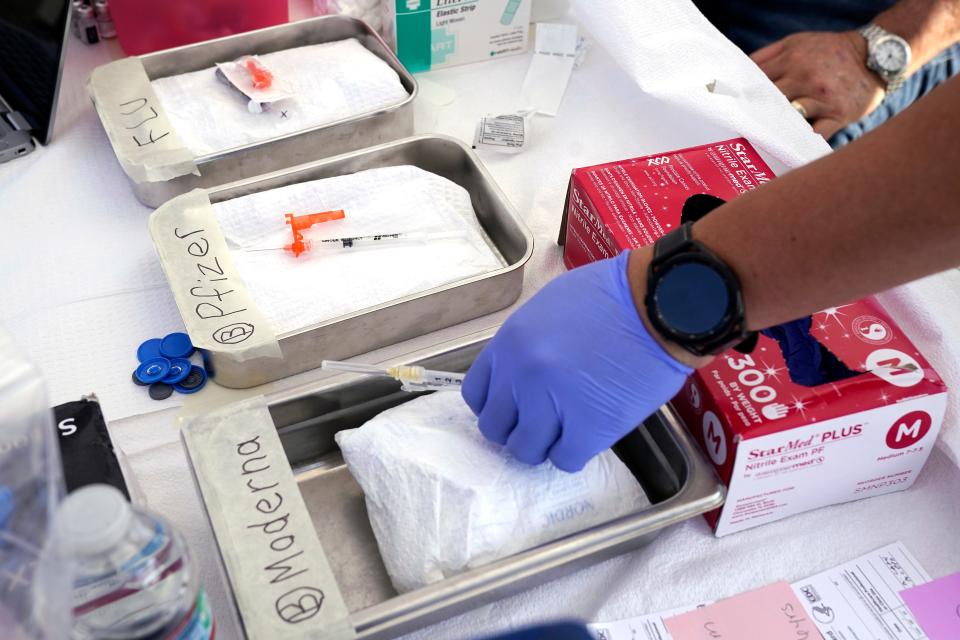When can I get the new COVID vaccine? Fresh shots OK'd by FDA to hit pharmacies
The Food and Drug Administration on Monday authorized updated COVID-19 vaccines aimed at more recent viral variants.
The move has been expected since earlier this summer, when an advisory committee recommended the move.
A different advisory committee meets Tuesday to recommend how the vaccine should be used.
COVID-19 infections have been rising since early July, data from the Centers for Disease Control and Prevention shows. Hospitalizations are up nearly 16% and deaths nearly 17% in the week that ended Thursday, compared to the week before, though totals remain well below previous peaks.
There's still some debate within the medical community about whether everyone stands to benefit substantially from another booster shot.
It's clear, experts say, that people who have multiple health problems or whose immune systems are weakened by age, illness or medications, should get boosted at least once a year and possibly more.
Will the new vaccines fight BA.2.86? Should you be worried about latest COVID variant?
For young healthy people, getting an annual shot provides less obvious benefit, as they are already at low risk for severe disease from COVID-19 and already have some protection from previous vaccinations and infections.
"People who are immune compromised, people who have obesity and diabetes, chronic heart, liver, kidney, neurologic disease ? those are people who really do benefit," said Dr. Paul Offit, who directs the Vaccine Education Center at the Children’s Hospital of Philadelphia. "If you're not vaccinated, you should be vaccinated."
But Offit does not think young, otherwise healthy people need to get annual shots. Vaccines will not protect against all infections with COVID-19 and the immune system's T cells have learned through previous vaccinations and infections how to block severe infections.
Luckily, said Dr. Jesse Goodman, a professor of medicine and infectious diseases at Georgetown University, the virus that causes COVID-19 has not mutated as much as the influenza virus that causes annual flu outbreaks, so most healthy people retain some protection. Both Goodman and Offit spoke to reporters Monday as part of the COVID-19 Vaccine Analysis Team, an informal group of vaccine experts.

"People who are older and people with chronic diseases should clearly get revaccinated," said Goodman, who chairs the COVAT group and is a former FDA chief scientist. "I'm still seeing older and immunocompromised people get severe disease. Much less than before, which is wonderful, but … for people who need it, it has definite value."
What happened with COVID vaccines Monday
The FDA's actions Monday related just to the vaccines manufactured by Moderna and Pfizer-BioNTech.
Both of their vaccines will be updated to target the omicron variant XBB.1.5, which was the dominant variant this spring and early summer.
It has since been replaced by other variants, but early research suggests the new vaccines will be protective against those variants, as well.
The FDA officially:
Approved use of the updated version of Comirnaty, Pfizer-BioNTech's vaccine, for people 12 and older.
Approved use of the updated version of Spikevax, Moderna's vaccine, for people 18 and older.
Authorized use of the updated versions of both Pfizer-BioNTech and Moderna's vaccines for emergency use in children ages 6 months through 11 years.
COVID spike has GOP fighting over masks. The White House wants no part of it.
What happens next
On Tuesday, from 10 a.m. to 4 p.m. EDT, the Advisory Committee on Immunization Practices will meet to discuss these vaccines and how they should be used.
The committee could recommend that everyone of all ages receive the updated vaccine, or it could allow people of any age to get it, while recommending a shot just for people at high risk, for example.
The committee, which advises the Centers for Disease Control and Prevention, is scheduled to hear an update on vaccine safety and effectiveness, the economics of vaccination and the current understanding of long COVID, in which people suffer symptoms months after their initial COVID-19 infection resolves.
CDC Director Mandy Cohen will have to sign off on any recommendation from the committee.
Moderna and Pfizer-BioNTech are expected to have vaccines ready to be delivered to pharmacies and health centers as soon as a recommendation is issued.
Unlike previous years of the pandemic, the government will no longer cover the cost of all COVID-19 vaccinations. People with health insurance should have coverage for the shot, but people without insurance may have to pay out of pocket for the $110 to $130 cost per shot.
What about the Novavax vaccine?
A third vaccine, made by Novavax, is also ready for delivery, though it was not covered by the FDA's action Monday.
According to the company, doses of the vaccine, which is protein based and does not use the mRNA technology of the other two, arrived in the U.S. on Monday.
Novavax will present updated data on its vaccine at Tuesday's committee meeting. The FDA is considering emergency authorization for the vaccine in people ages 12 and up.
"Novavax is ready for the commercial delivery of our updated protein-based non-mRNA COVID vaccine this fall, and we are working closely with the FDA on its review of our Emergency Use Authorization application," John Jacobs, Novavax president and CEO, said in a statement Monday.
Contact Karen Weintraub at [email protected].
Health and patient safety coverage at USA TODAY is made possible in part by a grant from the Masimo Foundation for Ethics, Innovation and Competition in Healthcare. The Masimo Foundation does not provide editorial input.
This article originally appeared on USA TODAY: FDA signs off on covid vaccine. New shots to be available soon
